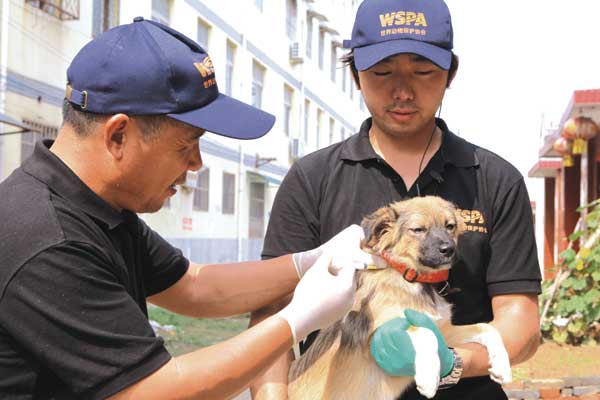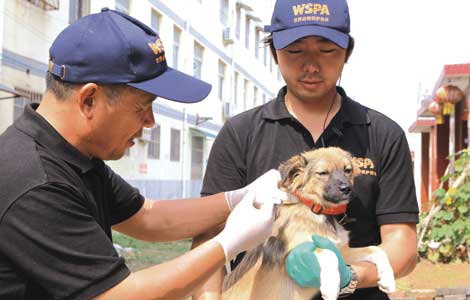Animal welfare to be added in training
Updated: 2013-10-08 00:05
By Yang Yao (China Daily)
|
||||||||
 |
|
Staff members with the World Society for the Protection of Animals give a rabies vaccination to a dog.[provided by WSPA to China daily ] |
Jia Zili, secretary-general of the Chinese Veterinary Medical Association's Animal Health Service and Welfare Branch, told China Daily that the ministry has included animal welfare as a compulsory course in veterinary education.
"Animal welfare is still not widely accepted, even among veterinarians, who are probably the closest to animals," said Jia, who has been involved in negotiations over the new policy.
He said that animal welfare is about more than providing basic care, food and water for the creatures. It also involves taking measures to satisfy the physical and mental needs of animals as well as protecting them from avoidable suffering caused by humans.
According to a joint survey conducted by Jia's association and the World Society for the Protection of Animals, of 61 universities and colleges that teach veterinary education only 33 include animal welfare education in the courses.
"And there is no scientific, well-written textbook on the topic," said Sun Quanhui, a science adviser to the international animal welfare society.
The joint goal of the two organizations is to create a comprehensive animal welfare education system by introducing established international practices.
The WSPA has many years of experience in animal welfare education around the world. It is used to working with governments, NGOs and educational institutions at different levels in different countries.
However, Sun said there is great value in working directly with veterinarians to improve animal welfare standards.
"One way we have found effective in many countries is to work with veterinarians, because vets interact with animals and with people who care for animals on a daily basis," he said.
"As China is becoming more involved than ever in international affairs, keeping up with the concept of animal welfare will benefit the meat trade and public health," he said.
"If animals are suffering, in pain, or abused, this will affect their physical state as well. If you better look after the animals, the food is more likely to be safe."
There is no legislation on the subject of animal welfare. However, a tentative step in that direction came last year when a non-compulsory guideline on the General Principle of Animal Welfare Assessment was submitted to the Ministry of Agriculture. The ministry is still reviewing the guideline, and the inclusion of animal welfare in veterinary courses is thought to be a recent addition.
"The exact date (of the new curriculum) has not been made known yet," Jia said.

 Firming friendships
Firming friendships
 A smog-filled Beijing targets polluting cars
A smog-filled Beijing targets polluting cars
 Animal welfare to be added in training
Animal welfare to be added in training Chasing the dragons
Chasing the dragons
 Boehner: US on path to default if Obama won't negotiate
Boehner: US on path to default if Obama won't negotiate
 New couples take wedding photos during holiday
New couples take wedding photos during holiday
 Williams beats Jankovic to win second China Open title
Williams beats Jankovic to win second China Open title
 Red alerts as Fitow closes in
Red alerts as Fitow closes in
Most Viewed
Editor's Picks

|

|

|

|

|

|
Today's Top News
WB cuts growth forecast for China, East Asia
Kerry hails weapons destruction
Robust home sales during holiday
China calls on the United States to stay solvent
Beijing targets polluting cars
APEC 'should take lead' in FTA talks
US, Japan warned over sea issues
Academics evaluate China at conference
US Weekly

|

|






